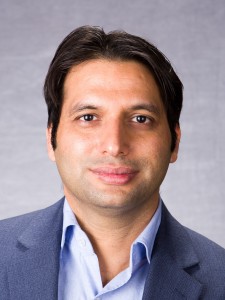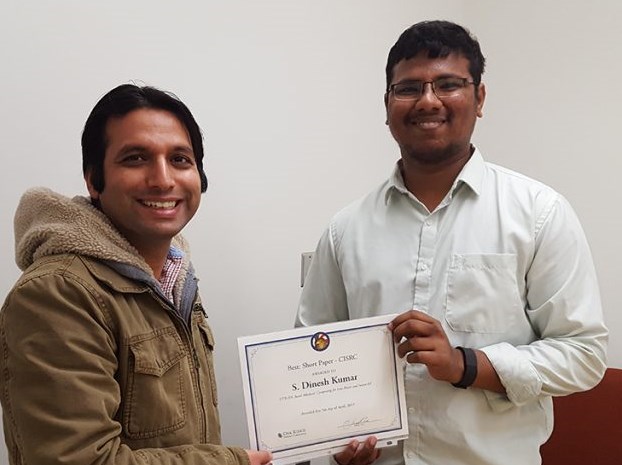
ECE Faculty member Dr. Himanshu Thapliyal and his students T. Varun and Dinesh Kumar recently won a Best Paper Award for their paper entitled “UTB-SOI Based Adiabatic Computing for Low Power and Secure IoT Devices”, which they presented at the 12th Annual Cyber and Information Security Research (CISR) Conference at the Oak Ridge National Laboratory April 4-6, 2017. The focus of this paper is on the use of quantum computing methods to reduce susceptibility of internet-connected devices to power analysis cybersecurity attacks.
It is estimated that there will be 20-30 billion devices connected to the Internet by 2020. With the emergence of this “Internet of Things” (IoT), there is an urgent need to design energy-efficient and secure IoT devices. Typical IoT devices are susceptible to hacking through analysis of the physical characteristics of the device, an approach known as side-channel attacks. One of the most common types of side-channel attacks, called a Differential Power Analysis (DPA), is to analyze the small power fluctuations into the device and attempt to identify password keys from these fluctuations during encryption or decryption.  However, any improvement in security techniques to stop this type of attack also leads to increased power consumption and reduction in battery life. Dr. Thapliyal’s paper proposes a new method based on a type of quantum computing, called adiabatic computing, as an alternative way to design energy-efficient and secure IoT devices. In addition, the paper investigates a specific type of hardware implementation for adiabatic computing, called Ultra-Thin-Body Silicon-on-Insulator (UTB-SOI). The paper showed that UTB-SOI based adiabatic computing reduces power by 92% compared to conventional devices, and simulations showed that this approach is secure against DPA attacks. Dr. Thapliyal’s cutting edge research in cybersecurity and quantum computing here at the University of Kentucky is creating new methods for designing low-power and secure IoT devices in fields such as manufacturing, automotive devices, and medical equipment.
However, any improvement in security techniques to stop this type of attack also leads to increased power consumption and reduction in battery life. Dr. Thapliyal’s paper proposes a new method based on a type of quantum computing, called adiabatic computing, as an alternative way to design energy-efficient and secure IoT devices. In addition, the paper investigates a specific type of hardware implementation for adiabatic computing, called Ultra-Thin-Body Silicon-on-Insulator (UTB-SOI). The paper showed that UTB-SOI based adiabatic computing reduces power by 92% compared to conventional devices, and simulations showed that this approach is secure against DPA attacks. Dr. Thapliyal’s cutting edge research in cybersecurity and quantum computing here at the University of Kentucky is creating new methods for designing low-power and secure IoT devices in fields such as manufacturing, automotive devices, and medical equipment.